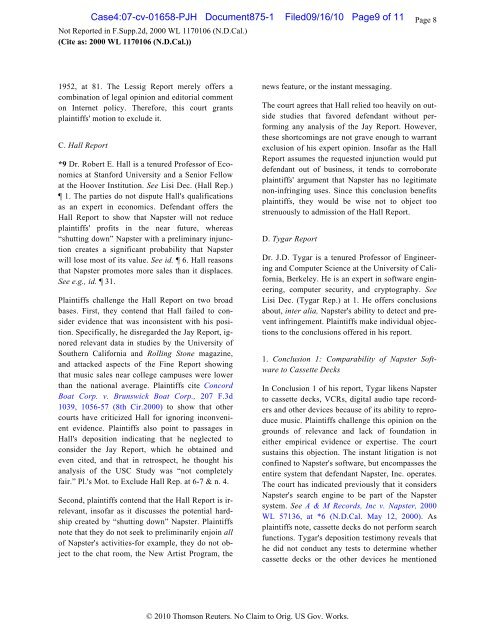exhibit 2 - SAP Lawsuit Portal
exhibit 2 - SAP Lawsuit Portal
exhibit 2 - SAP Lawsuit Portal
Create successful ePaper yourself
Turn your PDF publications into a flip-book with our unique Google optimized e-Paper software.
1952, at 81. The Lessig Report merely offers a<br />
combination of legal opinion and editorial comment<br />
on Internet policy. Therefore, this court grants<br />
plaintiffs' motion to exclude it.<br />
C. Hall Report<br />
Case4:07-cv-01658-PJH Document875-1 Filed09/16/10 Page9 of 11<br />
Not Reported in F.Supp.2d, 2000 WL 1170106 (N.D.Cal.)<br />
(Cite as: 2000 WL 1170106 (N.D.Cal.))<br />
*9 Dr. Robert E. Hall is a tenured Professor of Economics<br />
at Stanford University and a Senior Fellow<br />
at the Hoover Institution. See Lisi Dec. (Hall Rep.)<br />
1. The parties do not dispute Hall's qualifications<br />
as an expert in economics. Defendant offers the<br />
Hall Report to show that Napster will not reduce<br />
plaintiffs' profits in the near future, whereas<br />
“shutting down” Napster with a preliminary injunction<br />
creates a significant probability that Napster<br />
will lose most of its value. See id. 6. Hall reasons<br />
that Napster promotes more sales than it displaces.<br />
See e.g., id. 31.<br />
Plaintiffs challenge the Hall Report on two broad<br />
bases. First, they contend that Hall failed to consider<br />
evidence that was inconsistent with his position.<br />
Specifically, he disregarded the Jay Report, ignored<br />
relevant data in studies by the University of<br />
Southern California and Rolling Stone magazine,<br />
and attacked aspects of the Fine Report showing<br />
that music sales near college campuses were lower<br />
than the national average. Plaintiffs cite Concord<br />
Boat Corp. v. Brunswick Boat Corp., 207 F.3d<br />
1039, 1056-57 (8th Cir.2000) to show that other<br />
courts have criticized Hall for ignoring inconvenient<br />
evidence. Plaintiffs also point to passages in<br />
Hall's deposition indicating that he neglected to<br />
consider the Jay Report, which he obtained and<br />
even cited, and that in retrospect, he thought his<br />
analysis of the USC Study was “not completely<br />
fair.” Pl.'s Mot. to Exclude Hall Rep. at 6-7 & n. 4.<br />
Second, plaintiffs contend that the Hall Report is irrelevant,<br />
insofar as it discusses the potential hardship<br />
created by “shutting down” Napster. Plaintiffs<br />
note that they do not seek to preliminarily enjoin all<br />
of Napster's activities-for example, they do not object<br />
to the chat room, the New Artist Program, the<br />
news feature, or the instant messaging.<br />
The court agrees that Hall relied too heavily on outside<br />
studies that favored defendant without performing<br />
any analysis of the Jay Report. However,<br />
these shortcomings are not grave enough to warrant<br />
exclusion of his expert opinion. Insofar as the Hall<br />
Report assumes the requested injunction would put<br />
defendant out of business, it tends to corroborate<br />
plaintiffs' argument that Napster has no legitimate<br />
non-infringing uses. Since this conclusion benefits<br />
plaintiffs, they would be wise not to object too<br />
strenuously to admission of the Hall Report.<br />
D. Tygar Report<br />
Page 8<br />
Dr. J.D. Tygar is a tenured Professor of Engineering<br />
and Computer Science at the University of California,<br />
Berkeley. He is an expert in software engineering,<br />
computer security, and cryptography. See<br />
Lisi Dec. (Tygar Rep.) at 1. He offers conclusions<br />
about, inter alia, Napster's ability to detect and prevent<br />
infringement. Plaintiffs make individual objections<br />
to the conclusions offered in his report.<br />
1. Conclusion 1: Comparability of Napster Software<br />
to Cassette Decks<br />
© 2010 Thomson Reuters. No Claim to Orig. US Gov. Works.<br />
In Conclusion 1 of his report, Tygar likens Napster<br />
to cassette decks, VCRs, digital audio tape recorders<br />
and other devices because of its ability to reproduce<br />
music. Plaintiffs challenge this opinion on the<br />
grounds of relevance and lack of foundation in<br />
either empirical evidence or expertise. The court<br />
sustains this objection. The instant litigation is not<br />
confined to Napster's software, but encompasses the<br />
entire system that defendant Napster, Inc. operates.<br />
The court has indicated previously that it considers<br />
Napster's search engine to be part of the Napster<br />
system. See A & M Records, Inc v. Napster, 2000<br />
WL 57136, at *6 (N.D.Cal. May 12, 2000). As<br />
plaintiffs note, cassette decks do not perform search<br />
functions. Tygar's deposition testimony reveals that<br />
he did not conduct any tests to determine whether<br />
cassette decks or the other devices he mentioned


